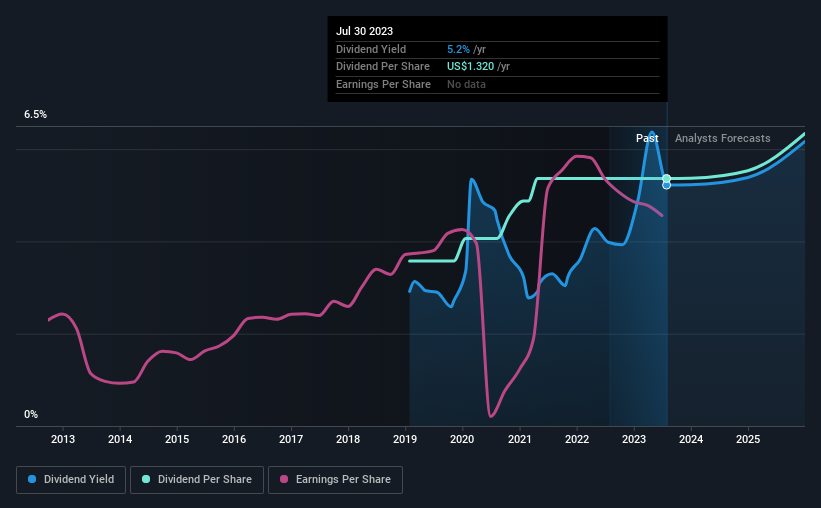
The board of Pacific Premier Bancorp, Inc. (NASDAQ:PPBI) has announced that it will pay a dividend on the 14th of August, with investors receiving $0.33 per share. Based on this payment, the dividend yield on the company's stock will be 5.2%, which is an attractive boost to shareholder returns.
View our latest analysis for Pacific Premier Bancorp
Pacific Premier Bancorp's Payment Expected To Have Solid Earnings Coverage
We like to see robust dividend yields, but that doesn't matter if the payment isn't sustainable.
Pacific Premier Bancorp has a short history of paying out dividends, with its current track record at only 4 years. Taking data from Pacific Premier Bancorp's last earnings report, the payout ratio is at a decent 47%, meaning that the company is able to pay out its dividend with some room to spare.
Over the next 3 years, EPS is forecast to fall by 7.4%. Fortunately, analysts forecast the future payout ratio to be 60% over the same time horizon, which is in the range that makes us comfortable with the sustainability of the dividend.

Pacific Premier Bancorp Is Still Building Its Track Record
The dividend hasn't seen any major cuts in the past, but the company has only been paying a dividend for 4 years, which isn't that long in the grand scheme of things. The annual payment during the last 4 years was $0.88 in 2019, and the most recent fiscal year payment was $1.32. This works out to be a compound annual growth rate (CAGR) of approximately 11% a year over that time. Pacific Premier Bancorp has been growing its dividend quite rapidly, which is exciting. However, the short payment history makes us question whether this performance will persist across a full market cycle.
The Dividend Has Growth Potential
Investors who have held shares in the company for the past few years will be happy with the dividend income they have received. Pacific Premier Bancorp has seen EPS rising for the last five years, at 5.6% per annum. Earnings are on the uptrend, and it is only paying a small portion of those earnings to shareholders.
In Summary
Overall, we think Pacific Premier Bancorp is a solid choice as a dividend stock, even though the dividend wasn't raised this year. While the payout ratios are a good sign, we are less enthusiastic about the company's dividend record. Taking all of this into consideration, the dividend looks viable moving forward, but investors should be mindful that the company has pushed the boundaries of sustainability in the past and may do so again.
Market movements attest to how highly valued a consistent dividend policy is compared to one which is more unpredictable. Still, investors need to consider a host of other factors, apart from dividend payments, when analysing a company. Just as an example, we've come across 2 warning signs for Pacific Premier Bancorp you should be aware of, and 1 of them doesn't sit too well with us. Looking for more high-yielding dividend ideas? Try our collection of strong dividend payers.
New: Manage All Your Stock Portfolios in One Place
We've created the ultimate portfolio companion for stock investors, and it's free.
• Connect an unlimited number of Portfolios and see your total in one currency
• Be alerted to new Warning Signs or Risks via email or mobile
• Track the Fair Value of your stocks
Have feedback on this article? Concerned about the content? Get in touch with us directly. Alternatively, email editorial-team (at) simplywallst.com.
This article by Simply Wall St is general in nature. We provide commentary based on historical data and analyst forecasts only using an unbiased methodology and our articles are not intended to be financial advice. It does not constitute a recommendation to buy or sell any stock, and does not take account of your objectives, or your financial situation. We aim to bring you long-term focused analysis driven by fundamental data. Note that our analysis may not factor in the latest price-sensitive company announcements or qualitative material. Simply Wall St has no position in any stocks mentioned.
About NasdaqGS:PPBI
Pacific Premier Bancorp
Operates as the bank holding company for Pacific Premier Bank that provides various banking products and services in the United States.
Flawless balance sheet with proven track record and pays a dividend.
Similar Companies
Market Insights
Community Narratives




